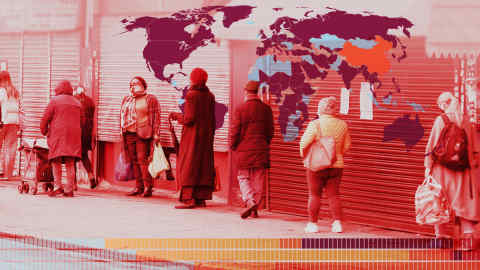[ad_1]
Health workers are set to be spared onerous Covid-19 self-isolation rules amid a staffing crisis as ministers try to keep key public services and business working ahead of the lowering of England’s defences against the disease.
Boris Johnson, UK prime minister, is expected on Monday to confirm that most remaining Covid-19 restrictions will be lifted on July 19 in spite of surging infections, with ministers warning that daily cases could hit a record 100,000.
Downing Street said NHS staff may be exempted from rules that require them to quarantine after close contact with an infected person, amid fears that widespread staff absences could undermine attempts to clear a mountainous backlog of treatment alongside battling coronavirus.
People notified through the Covid-19 app that they have been close to someone who has subsequently tested positive for the disease are expected to stay at home for 10 days even though the contact may have been relatively fleeting.
But Grant Shapps, transport secretary, on Friday confirmed the NHS Covid-19 app could be “tuned†so that it “pinged†fewer people — advising them to self-isolate.
Business leaders, particularly in hospitality, travel and distribution, have warned that they face massive disruption because of staff absences caused by soaring Covid-19 rates and self-isolation rules.
Fresh data on Friday underlined the extent of the surge in cases which the government is grappling with a little more than a week before its planned relaxation of remaining Covid restrictions.
The reproduction rate, or R value, of Covid-19, had risen to between 1.2 and 1.5, up slightly from between 1.1 and 1.3 the week before, according to the Government Office for Science.
The Office for National Statistics infection survey, which measures symptomatic and asymptomatic cases, estimated 401,200 people had coronavirus in the week ending July 3, the highest level of infections since late February.
But infections increased 56 per cent week on week, compared with a growth rate of nearly 70 per cent a week earlier.
In some NHS trusts the number of staff having to take time off work has stretched into triple figures and is projected to rise as infections soar. An increase will further jeopardise the health service’s attempt to tackle a queue for treatment, which this week hit 5.3m people, the highest since records began in 2007.
Ministers have attempted to soften the edges of the quarantine policy following criticism from Tory MPs about the plan to maintain the current self-isolation regime until August 16.
Asked if there could be a specific exemption for NHS staff, a No 10 spokesman said: “It’s something we’re looking at ahead of step fourâ€. One official said there was a growing recognition that a “pragmatic†solution was needed to protect the health service.
However, Downing Street’s suggestion that NHS staff might be exempt from the system to avoid a staffing crisis in hospitals raised questions about whether other key professions — for example lorry drivers involved in food distribution — might also be exempt.
Saffron Cordery, deputy chief executive of NHS Providers, which represents hospital, ambulance, community and mental health services, said frontline leaders were already coping with huge pressure on services, from emergency care to mental health, as well as treating rising numbers of Covid patients.
“All those pressures are being worsened by the number having to stay off work and isolate, even though they’ve been double-jabbed, after being pinged by Test and Trace,†she added.
These absences, potentially worsened by the number of staff due to take summer holidays, meant “there will be rota gaps which can translate into cancelled operationsâ€, she added. NHS Providers was calling for the planned August 16 exemption from isolation for people who had been double-jabbed to be introduced immediately, she said.
Stella Vig, a council member for the Royal College of Surgeons of England, described the number of NHS staff having to self-isolate as “a major problemâ€. A possible solution, she suggested, was an exemption from the self-isolation requirement with daily lateral flow tests on anyone who was a primary contact of a confirmed case.
During the height of the second wave, last January, there were 637,734 staff working days in the NHS lost because of Covid-19, mainly from workers forced to self-isolate. In late December, infections peaked at 81,000 testing positive in a single day.
Health secretary Sajid Javid has predicted infections could rise as high as 100,000 a day over the coming weeks, underlining the potential for even more extensive staff absences.
Vaccines continue to prove effective in preventing severe disease from the Delta variant, according to Public Health England data released on Friday. Of the 1,904 people admitted to hospital with the Delta variant, 1,557 were unvaccinated or had only received one dose of a vaccine.
[ad_2]
Source link






